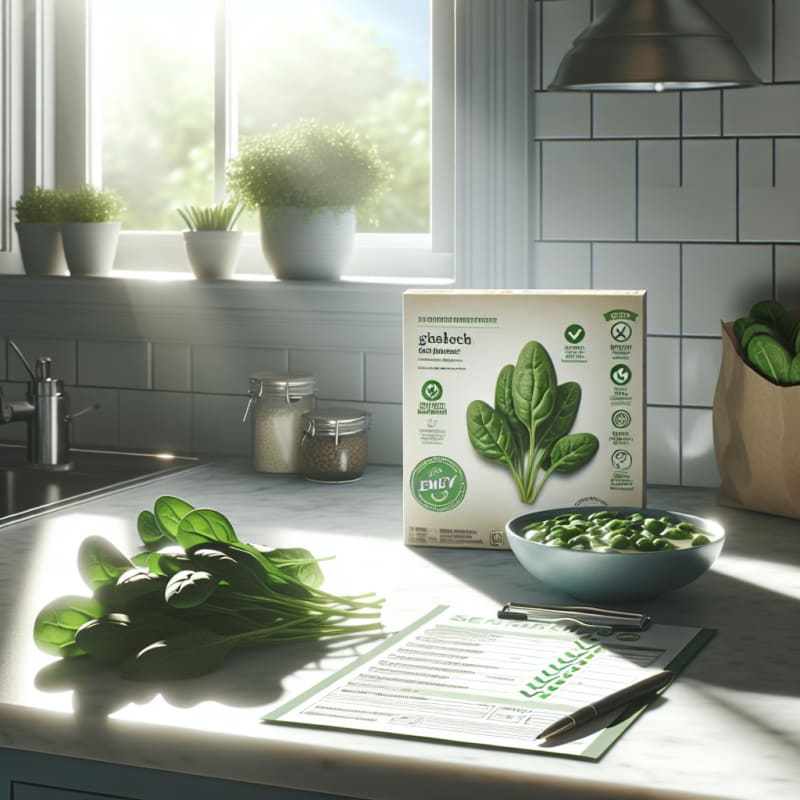Organic Frozen Spinach Recall: What You Need to Know About Listeria Risk and Food Safety
Food safety is a growing concern for consumers, especially those with dietary sensitivities or preferences. The recent nationwide recall of organic frozen spinach due to potential Listeria monocytogenes contamination highlights the importance of staying informed and making smart choices when buying or consuming food. This article explains the recall, its implications, and how tools like Food Scan Genius can help you navigate ingredient risks.
What Happened? Organic Frozen Spinach Recalled Nationwide
On June 10, 2024, CBS News reported that a major distributor recalled packages of organic frozen spinach sold nationwide after routine testing detected potential contamination with Listeria monocytogenes. The recall affects multiple brands and lot numbers, urging consumers to check their freezers and avoid consuming affected products.
| Product | Brand(s) | Recall Reason | Distributed | Action |
|---|---|---|---|---|
| Organic Frozen Spinach | Multiple (see FDA) | Potential Listeria contamination | Nationwide (U.S.) | Do not consume; return or dispose |
Why Is Listeria a Concern?
Listeria monocytogenes is a bacteria that can cause serious illness, especially in pregnant women, older adults, and those with weakened immune systems. Symptoms include fever, muscle aches, and gastrointestinal distress, and in severe cases, it can lead to miscarriage or death[CDC].
- High-risk groups: Pregnant women, elderly, immunocompromised
- Symptoms: Fever, nausea, muscle aches, confusion
- Incubation: Symptoms may appear days to weeks after exposure
How to Protect Yourself: Food Safety Tips
- Check recall lists: Visit the FDA recalls page regularly
- Read ingredient labels: Look for batch numbers and expiration dates
- Proper storage: Keep frozen foods at the correct temperature
- Cook thoroughly: Cooking can kill some bacteria, but not all toxins
- Use smart tools: Apps like Food Scan Genius help identify risks quickly
Recent Food Safety Alerts and Regulatory Updates
Food recalls and contamination alerts are increasingly common. In addition to the spinach recall, recent news includes:
- FDA’s new labeling requirements for food allergens (2024)
- Ice cream recall due to Listeria (NBC News, June 2024)
- EFSA’s updated guidance on food contaminants (Europe, May 2024)
These developments impact people with food allergies, sensitivities, or those following vegan, plant-based, or keto diets. Regulatory agencies like the FDA (U.S.) and EFSA (Europe) are working to improve transparency and reduce risks[PubMed].
Long-Term Implications: Why Food Safety Matters for Everyone
Food recalls are not just isolated events—they signal larger challenges in supply chain safety and ingredient transparency. As consumer demand for organic and plant-based foods grows, so does the need for robust testing and clear labeling[NCBI]. Understanding these risks helps protect vulnerable groups and supports ethical, sustainable food choices.
How Food Scan Genius Can Help
Food Scan Genius is an app designed to simplify ingredient checks for people with food sensitivities, allergies, or dietary preferences. By scanning product barcodes, you can instantly see recall alerts, allergen information, and suitability for vegan, keto, or gluten-free diets.
User Testimonial: “After hearing about the spinach recall, I used Food Scan Genius to check all my frozen veggies. It flagged the affected product and gave me peace of mind. Highly recommend for anyone with allergies or dietary restrictions!” — Jessica P., Chicago
Download Food Scan Genius to make smart, safe choices every time you shop.
Frequently Asked Questions (FAQ)
- Q: What should I do if I bought recalled spinach?
A: Do not eat it. Dispose of it or return for a refund. Check the FDA recall notice for details. - Q: How can I stay updated on food recalls?
A: Subscribe to FDA alerts, follow trusted news sources, or use apps like Food Scan Genius. - Q: Is Listeria only a risk in frozen foods?
A: No, Listeria can contaminate a range of foods, including dairy, deli meats, and produce. - Q: Are organic foods safer?
A: Organic foods follow strict guidelines, but contamination can still occur. Always check recalls and labels.
Conclusion: Making Smart Choices in a Changing Food Landscape
Ingredient transparency and food safety are essential for everyone—especially those with allergies, sensitivities, or ethical food concerns. Staying informed about recalls, reading labels, and using smart tools like Food Scan Genius empowers you to make safer, smarter choices. As food trends and regulations evolve, vigilance and technology are your best allies in protecting your health and supporting sustainable food systems.
References
- CDC: Listeria Information
- FDA: Recalls, Market Withdrawals, Safety Alerts
- PubMed: Listeria Outbreaks
- NCBI: Food Safety and Organic Foods
- EFSA: Food Contaminants
- CBS News: Spinach Recall
- NBC News: Ice Cream Recall
- Food Safety News: EFSA Guidance Update
- FDA: New Labeling Requirements





